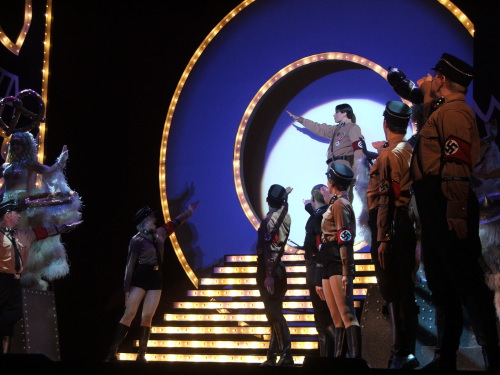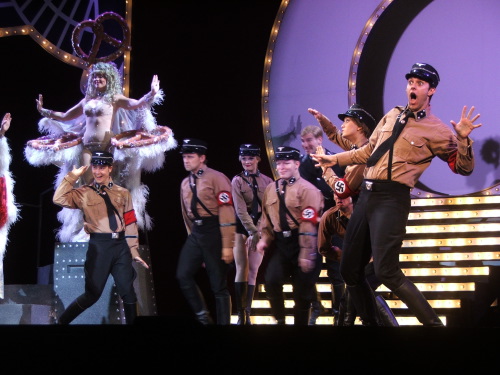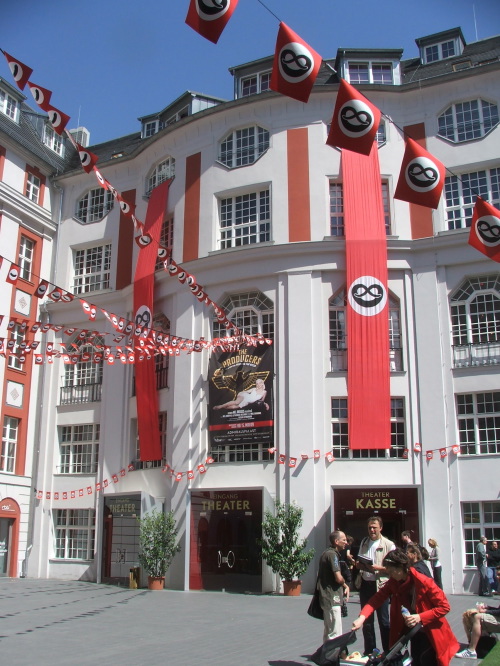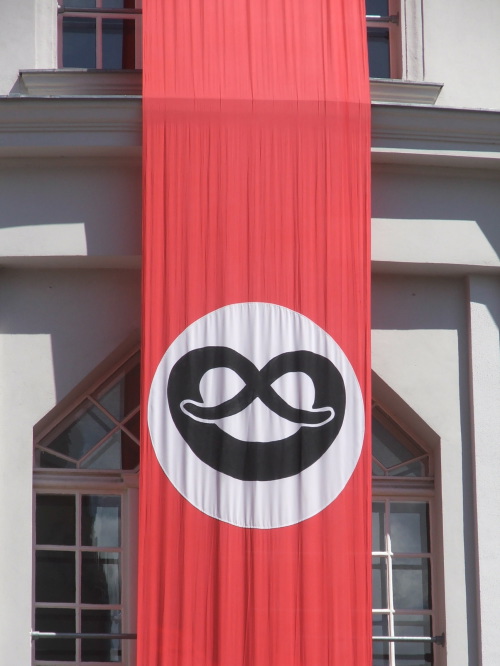
BERLIN
Mel Brooks' musical The Producers premiered in Germany on Sunday at the Admiral Palast theatre in Berlin.
The musical, for those unfamiliar with it, is the story of two scheming Broadway producers, the greedy Max Bialystock and his neurotic accountant Leo Bloom, who set out to stage the worst show ever produced, thereby ensuring a flop, so that they can keep the invested money for themselves.
The Producers has been a critical and commercial hit since it started running in 2001 and there have been productions everywhere from London to Tel Aviv. The fact that it's going up in Germany would hardly be newsworthy if not for the simple fact that the name of the god-awful play that the eponymous producers commission - that stinker of all stinkers -is "Springtime For Hitler", a loving musical tribute to the Führer.
Accordingly, there have been several recent articles during the run-up to the show, both in and outside of Germany, to the effect of: "Is Germany "ready" for a play that deals comically with the darkest elements of its history?
Is Germany ready to see a dancing, singing Hitler?
Brooks, though happy that the show was coming to Berlin, had wondered this himself.
"I'm curious how the Berliners will receive my handling of Hitler, and I do wonder how they'll react to all the swastikas", Brooks told TIP magazine in an interview before the premiere.
"There is the danger, in putting on the show in Germany, that the swastikas and all the jokes about Hitler and the Nazis will take on far too much weight."
The Producers had a moderately successful run last year in Vienna - the first time the show was performed in German - but this was Germany, in history-scarred Berlin, and it would be showing at the Admiral Palast, a theatre where Adolf Hitler himself took in shows and had a special "Führer's Box" with the best view in the house.
So how would people react? I went to a preview of the show on Friday before it's official premiere to find out.
Since it's illegal to display the swastika publicly in Germany, the garish red banners and flags that draped the outside of the theatre to advertise the show instead bore the stark, black image of...a pretzel. Outside, people milled about in the courtyard drinking beers before filing into the theatre - a riot of gold inlay and red upholstery dominated by an enormous chandelier.
The Producers, as Brooks and others have pointed out, is not actually about Hitler or the Nazis. It's about a couple of guys trying to make a crooked buck.
"It's a 10-minute segment of a two-and-a-half-hour show", said Nigel West, the show's director, when I talked with him a day earlier.
Nevertheless, the scene in The Producers that West was referring to, the scene that generates the most press - and also the one that would presumably most test a German audience - is the climactic premiere of the play-within-the-play's "Springtime for Hitler" number. The scene is so ridiculous, complete with tap-dancing Brownshirts and showgirls outfitted with enormous sausage-shaped headdresses, that it's a feat not to laugh. And when Hitler finally appears onstage he is so campy and effete a figure that the effect is purely comedic.
"We certainly don't put our friend Mr. H on any kind of pedestal", said West. "It's really rather making fun of him."
Quite.
Yet just when you think the absurdity has reached its maximum altitude, Brooks takes it higher. Eventually there's a full phalanx of black-uniformed S.S. troops on stage, goose-stepping and Sieg Heil-ing in time to gunshots and bomb-blasts and twirling around in a gigantic human swastika formation. It's obviously meant to be a bit much. But it's a bit much.
During the Austrian production there would be this "automatic applause" after the big number, said West, "But every now and then you'd look around and someone wouldn't be laughing - usually an older person." He hoped young, liberal Berlin would be more open to the play and its exuberant irreverence.
Berlin is indeed a liberal city with a daring theatre scene. It's not a place that shies away from controversy or from the risqué. Yet, like Germany in general, it has a special relationship with guilt and, due to the country's history, guilt is as German as apple strudel (though some would say that apple strudel, like Hitler, is actually Austrian). Inextricable from that guilt is Hitler - whose figure occupies an enormous amount of space in the German psyche. He's not just a monster; he's their monster. Therefore, it's hardly surprising that people are wary of how the subject is treated.
The central question is whether laughter in the face of painful memories and symbols drains them of their power or trivializes their meaning.
Brooks is a believer in the former.
"The best way to deal with crazy dictators is to make fun of them", Brooks told TIP magazine. "If you can present Adolf as a ridiculous figure, you've won."
"Humor is a powerful weapon, especially black humor", he added. "And it's very funny and entertaining to see Hitler sing and dance."
As for funny and entertaining - the show was both. The applause was enthusiastic throughout, there was cheering, and, at the end, even scattered standing ovations. I kept craning my neck to watch people's individual reactions - were they smiling? cringing? - but it was mostly a fruitless exercise. It's a funny show and people laughed when you would expect them to. It was, in other words, a success, and, as far as I could tell, no one fainted.
"It was the best show we've ever had", said Andreas Bieber, the actor playing Leo Bloom, as he chatted with reporters after the show. "Actually they laughed way too many times."
Catherin, 21, agreed that the show was funny but said it was "a little weird" to see the Nazi symbols presented in a lighthearted context. She liked the show but expressed a sense of alienation at certain points. She said she understood why Mel Brooks had written the show - "to deal with the past" - but added that, "...For me, being a German, it's not easy to laugh about everything that was being said and done in this musical."
And then for some, the question is neither aesthetic nor political-- but personal.
As people were getting their coats I met Friederike, who looked to be about 70. She had lived through some of what Germans call "the Nazi time" and remembered the nighttime bombing raids from her childhood. She had lost relatives and her father had been locked up by people in uniforms like those worn by the dancers twirling and smiling on stage. She praised the show as a whole and the skill of the actors but said it had been a difficult decision to attend.
"I thought it was very good", she told me firmly, "but this scene with Hitler...the laughter caught in my throat."


